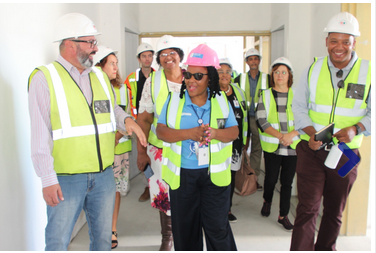Construction and project management methodology need an upgrade

07-10-2015
Read : 66 times
Bizcommunity.com
Source
All building projects have the potential for efficiency, effectiveness and cohesion, but unfortunately many projects conducted in today's African environment are inherently inefficient.
South African managing director of Onsite Control Systems, developers of a cloud-based collaboration system, John Haefele, says lessons can be learnt by examining these projects, their strengths and weaknesses, their management strategies, and the reasons for their success or failure.
"Teams work ferociously against inherent problems to keep the project aligned, but due to the industry's traditional methodologies and historically flawed tendencies, these issues prevail and the project is not always a success," he says.
"Diligent project teams and well-organised project managers do their best to tackle the challenges presented within the available systems and using traditional methods, but due to the lack of alternatives the results tend to be less than desirable. The reasons for any project's failure are easily recognisable, definable, and can be overcome with the appropriate system and management mind-set change."
Multiple channels
"The multiple channels and methods of communication create the challenges we face on a daily basis and are the reason we continue to struggle," Haefele explains. "Slow adaption towards any change in the traditionally accepted method of information creation and flow, as well as the technology required, are significant challenges and definite stumbling blocks.
"It is important to realise that the main contractor's or subcontractor's internal management 'methods' are just as much of a risk or benefit to the project as the architect's, engineer's or principal quantity surveyor's internal management 'methods'. The same can be said for any discipline on the project and it's important to understand that these 'methods' are inherently hindered by traditionally accepted methods."
It is not enough to digitise the currently accepted information flow. Rather, a successful solution will re-engineer and ease the previously accepted method of information creation, work flow and execution management, and as a by-product deliver effective results and reports, while increasing transparency along the way.
Substantial change
It will deliver a substantial change to the industry across all disciplines, and allow the team to act as one, from feasibility to handover. It will support all involved, assisting on every hierarchical level to achieve the project team's goals.
In 2005, Haefele envisaged Onsite Control Systems and teamed up with a senior solutions architect and owner of the software development firm Haefele Software in the United Kingdom to develop and launch the OnSiteIMS System.
The OnSiteIMS solution is a cloud-based collaboration system that provides one platform for all your development related information. It re-engineers information creation methods across all channels and from all disciplines, allowing the channelling of any information type (instructions, tasks, documents, actions, drawings, requests etc.) between the client, developer, professional team and contractor, and onto subcontractors and suppliers in a manner that is manageable, productive, efficient and traceable, from both mobile and online interfaces.
It provides one easily manageable, secure, reliable, and always available framework for all communication creation and flow, reducing the resourcing needed to manage the various disciplines as well as in managing themselves.
Recent News
Here are recent news articles from the Building and Construction Industry.
Have you signed up for your free copy yet?









